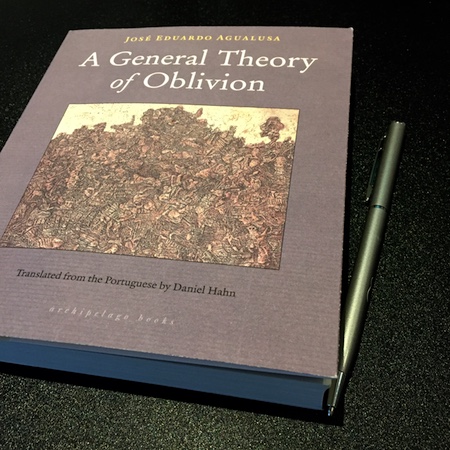Description: A General Theory of Oblivion is an absolutely lovely little book about an agoraphobic woman who bricks herself into her Luandan apartment during civil unrest in Angola in the 70s. Ludo has been brought to Angola from Portugal to live with her sister and brother-in-law. On the eve of Angolan independence she bricks up the apartment door in an effort to stay safe from looters and thugs looking for money and jewels. Her sister and brother-in-law have gone out for the evening and never return. She doesn’t know what’s happened to them, only that she’s afraid, can’t speak the language, and hooligans are threatening to return. The crazy twist is that Ludo stays bricked in for 30 years, living off vegetables that she grows on the terrace and pigeons. This is a story that slowly unfolds, with each layer of the intertwining lives of the characters beautifully unwrapped. A lovingly crafted story about love and survival.
• Winner of the 2017 Dublin International Literary Award!
• Shortlisted for the Man Booker International Prize 2016
• Shortlisted for the Three Percent Best Translated Book Award
Perfect Read for fans of Gabriel Garcia Marquez. This is a winding family tale with beautiful descriptive prose, and such elegance. Applause to the writer Jose Eduardo Agualusa and translator Daniel Hahn.
Favourite Moment: Ludo sacrifices a lot to stay hidden in her apartment, but there is a hilarious moment when the tenants below her house chickens on their balcony. Ludo fashions a noose and nonchalantly nabs the rooster, who doesn’t seem to give a flap and is still happily alive when released. This gives Ludo an idea that this doesn’t need to be a one-off adventure. She can raise chickens too, so she goes after a hen. The hen is far less enthused than the rooster and kicks up a fuss. It’s a funny and triumphant moment for this poor woman.
Although this is fiction, Ludovica Mano died in Luanda, at the Sagrada Esperanca clinic, in the early hours of October 5, 2010. She was eight-five years old. Sabalu Estevao Capitango gave Agualusa copies of ten notebooks in which Ludo had been writing her diary, in the first years of the twenty-eight during which she had shut herself away. In addition, Agualusa had access to the diaries that followed her release and to a huge collection of photographs taken of Ludo’s texts and charcoal pictures on the walls of her apartment. He’s used her diaries, poems, and reflections to reconstruct much of her first-hand account, albeit fictionalized for the novel.
A General Theory of Oblivion
by Jose Eduardo Agualusa
translated from the Portuguese by Daniel Hahn
Published by Archipelago Books
